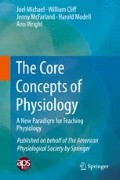Abstract
Calls for reform of American science education go back at least to the early twentieth century, and in recent years there has been a plethora of reports and recommendations about how to “fix” the problems that have been identified. One notable problem is the continued focus on breadth versus depth of understanding in STEM disciplines. In part, this reflects the enormous expansion of knowledge in all fields of science. One consequence is that more is known than can possibly be mastered by students.
All recent reports calling for significant change in American science education have included recommendations that learning objectives focus on the mastery of core concepts as opposed to the mere accumulation of ever more facts.
Physiology faces the same challenges as all of the other STEM disciplines. However, it also faces a number of additional challenges that call for changes in the way we teach. Physiology is hard for students to learn because more is known than they can learn. In addition, the very nature of the disciplines poses problems for students. Physiology is hard to teach because the wide spectrum of students taking physiology courses, the inherent nature of the discipline, and because the goal of physiology teaching is meaningful learning, not the accumulation of facts.
A focus on core concepts of physiology can help students achieve meaningful learning and can help teachers facilitate the acquisition of meaningful learning.
Access this chapter
Tax calculation will be finalised at checkout
Purchases are for personal use only
References
American Association for the Advancement of Science (2011) Vision and change in undergraduate biology education: a call to action. American Association for the Advancement of Science, Washington, DC
Association of American Medical Colleges (1984) Physicians for the twenty-first century: the GPEP report. Report of the panel on the general professional education of the physician and college preparation for medicine. Association of American Medical Colleges, Washington, DC
Association of American Medical Colleges and the Howard Hughes Medical Institute (2009) Scientific foundations for future physicians. Association of American Medical Colleges, Washington, DC
Bornmann L, Mutz R (2015) Growth rates of modern science: a bibliometric analysis based on the number of publications and cited references. J Assoc Info Sci Tech 66:2215–2222
Bransford JD, Brown AL, Cocking RR (1999) How people learn: brain, mind, experience, and school. National Academies Press, Washington, DC
Carroll RG (2001) Cardiovascular pressure-flow relationships: what should be taught? Adv Physiol Educ 25:80–86
Colman AM (2006) A dictionary of psychology, 2nd edn. Oxford University Press, Oxford
Dewey J (1910) Science as subject-matter and as method. Science 31:121–127
Duschl RA, Schweingruber HA, Shouse AW (eds) (2007) Taking science to school: learning and teaching science in grades K-8. National Academies Press, Washington, DC
Evens M, Michael J (2006) One-on-one tutoring by humans and computers. Lawrence Erlbaum Associates, Mahwah, NJ
Feder ME (2005) Aims of undergraduate physiology education: a view from the University of Chicago. Adv Physiol Educ 29:3–10
Garvin-Doxas K, Klymkowsky M, Elrod S (2007) Building, using, and maximizing the impact of concept inventories in the biological sciences: report on a National Science Foundation–sponsored conference on the construction of concept inventories in the biological sciences. CBE Life Sci Educ 6:277–282
Harlen W (2010) Principles and big ideas of science education. Association for Science Education, Hatfield
Kay D, Kibble J (2016) Learning theory 101: application to everyday teaching and scholarship. Adv Physiol Educ 40:17–25
Michael J (2006) Where’s the evidence that active learning works? Adv Physiol Educ 30:159–167
Michael J (2007) Conceptual assessment in the biological sciences: a National Science Foundation-sponsored workshop. Adv Physiol Educ 31:389–391
Michael J, McFarland J (2011) The core principles (“big ideas”) of physiology: results of faculty surveys. Adv Physiol Educ 35:336–341
Michael JA, Rovick AA (1999) Problem solving in physiology. Prentice Hall, Upper Saddle River, NJ
Michael J, Modell H, McFarland J, Cliff W (2009) The “core principles” of physiology: what should students understand? Adv Physiol Educ 33:10–16
Modell HI (2000) How to help students understand physiology? Emphasize general models. Adv Physiol Educ 23:101–107
National Research Council (2001) Knowing what students know: the science and design of educational assessment. The National Academy Press, Washington, DC
National Research Council Committee on High-School Biology Education (1990) Fulfilling the promise: biology education in the nation’s schools. National Academy Press, Washington, DC
National Research Council Committee on Undergraduate Biology Education to Prepare Research Scientists for the 21st Century (2003) BIO2010: transforming undergraduate education for future research biologists. National Academy Press, Washington, DC
Perkins DN, Salomon G (1994) Transfer of learning. In: Husen T, Postlethwaite TN (eds) International encyclopedia of education, 2nd edn. Pergamon Press, Oxford
Prinz J (2005) Concepts. In: Borchert DM (ed) Encyclopedia of philosophy, 2nd edn. Thomson Gale, Farmington Hills, MI
Rovick AA, Michael JA, Modell HI, Bruce DS, Horwitz B, Adamson T, Richardson DR, Silverthorn DU, Whitescarver SA (1999) How accurate are our assumptions about our students’ background knowledge? Am J Physiol 276:S93–S101 (Adv Physiol Educ 21)
Sturges D, Maurer T (2013) Allied health students’ perception of class difficulty: the case of undergraduate human anatomy and physiology classes. Int J Allied Health Sci Pract 11(4):Article 9
United States National Commission on Excellence in Education (1983) A nation at risk: the imperative for reform. National Commission on Excellence in Education, Washington, DC
Vander AJ (1998) Some difficult topics to teach (and not to teach) in renal physiology. Am J Physiol 275 (Adv Physiol Educ 20:S148–S156)
Wiggins G, McTighe J (2005) Understanding by design, expanded 2nd edn. Association for Supervision and Curriculum Design, Arlington, VA
Author information
Authors and Affiliations
Rights and permissions
Copyright information
© 2017 The American Physiological Society
About this chapter
Cite this chapter
Michael, J., Cliff, W., McFarland, J., Modell, H., Wright, A. (2017). Reforming Science Education/Reforming Physiology Education. In: The Core Concepts of Physiology. Springer, New York, NY. https://doi.org/10.1007/978-1-4939-6909-8_1
Download citation
DOI: https://doi.org/10.1007/978-1-4939-6909-8_1
Published:
Publisher Name: Springer, New York, NY
Print ISBN: 978-1-4939-6907-4
Online ISBN: 978-1-4939-6909-8
eBook Packages: Biomedical and Life SciencesBiomedical and Life Sciences (R0)

